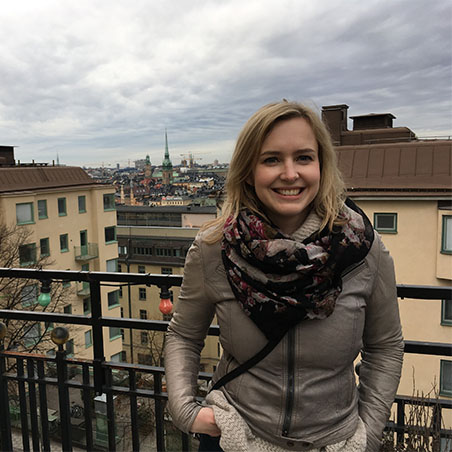Miranda Spence
Partner, Aird & Berlis LLP
Bachelor of Arts (Hons.), Contemporary Studies and Political Science, 2007
You have to have a compelling narrative to be persuasive in front of a judge.
Miranda Spence didn’t take any business classes when she was at King’s. Nor did she focus on business law classes at the University of Toronto’s Faculty of Law. But here she is, a partner in the Toronto law firm Aird & Berlis LLP, with a broad litigation practice that includes “an emphasis on general commercial proceedings, financial services litigation and construction and leasing disputes”.
Miranda says that when she started, she had the tools for the job, but not the knowledge.
“I had zero corporate law expertise coming in,” she says. “The first years of practice are an incredibly steep learning curve, no matter what your background. At King’s, I learned how to think critically and look at things from different angles. I found myself relying on those skills heavily during my early years as a lawyer.”
Miranda went to law school not convinced that she wanted to practise law. She thought of it more as a stepping-stone to some other career. Her first few months did nothing to disabuse her of that notion. She had just come out of the Contemporary Studies Program at King’s. Some of her classmates were engineers or graduates of science programs.
“The scientists were frustrated with law because there was no right answer. I was frustrated with law because we were reading cases from the 1600s and, in a relatively uncritical manner, applying the concepts developed in those cases to today’s legal issues. In many ways, it was the opposite of what I had learned at King’s, which was to challenge the received wisdom. I thought that the law was way too rigid.”
But she kept at it. After her first year, Miranda attended the legal industry’s version of speed dating. Students send applications to various law firms and then, if they are lucky, get fifteen minute interviews with a few firms in a convention centre. If their luck holds, that will lead to a summer job, which could then lead to a chance to article with the same firm. If skill and luck and hard work combine, that could then lead to a job as a junior associate. That’s the path Miranda took with Aird & Berlis. Then, in January of 2017, she was accepted as a partner with the firm.
“That was my first year of eligibility. I think that being accepted in my first year was a product of hard work and having strong supporters within the firm,” she says.
Miranda loves the fast pace of the work. She admits it sounds dry when she explains the kinds of cases she deals with. They often involve a bank trying to recoup money it lent to a business that is failing. Each day that passes is money lost. The stakes can be high. Her job includes telling the story of what happened, and convincing the stakeholders and the court to agree on the best way forward.
“So in a matter of days you have to understand a business, understand their financial situation, develop a plan, and present it to the court in a comprehensive yet sympathetic manner. You have to have a compelling narrative to be persuasive in front of a judge.”
Despite never expecting to find her calling in corporate law, Miranda considers herself lucky to have found a career that is intellectually stimulating, and presents new challenges on a daily basis. She now sees the law as much more flexible than her first impression suggested.
“There is a lot of room for creativity in the practice of law,” she says. “Even though we are bound by the principles established in past cases, there are always new angles, new ways of interpreting those principles, and occasionally even opportunities to make new law.”
Miranda credits her King’s education with driving her to question established practices, and to seek to understand what underlies them: “I try to avoid doing anything a certain way just because that’s the way it’s always been done. It is always worth asking – Why?”
Posted: Jan. 2018
